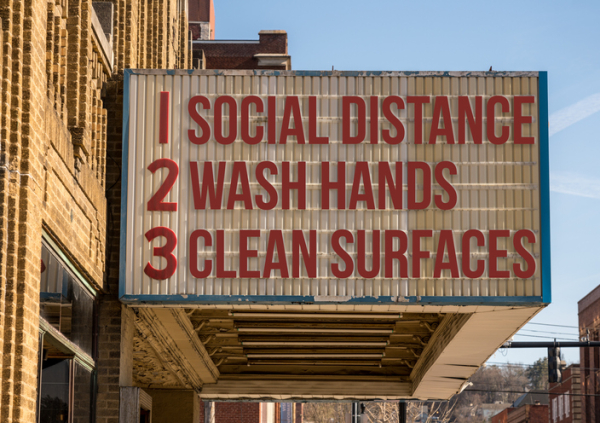Stress and COVID-19: How you can cope.

Wednesday, March 25, 2020 –  Ulysses S. Grant once said, “The friend in my adversity I shall always cherish most. I can better trust those who helped to relieve the gloom of my dark hours than those who are so ready to enjoy with me the sunshine of my prosperity.”
Ulysses S. Grant once said, “The friend in my adversity I shall always cherish most. I can better trust those who helped to relieve the gloom of my dark hours than those who are so ready to enjoy with me the sunshine of my prosperity.”
While coronavirus has turned many of our lives upside down, the silver lining has been watching businesses, neighbors, friends, and families come together in ways many of us have never had the opportunity to witness. Whether it’s neighbors bringing groceries to elderly or other home-bound residents, or businesses rallying to help employees maintain their incomes, there are examples every day of the good in the world — and in the very communities where we live and work.
Unfortunately, not everyone has a support system of family, friends, or neighbors to help them through this difficult time. Even when we do have support, the emotional and financial toll of staying at home makes it nearly impossible to avoid feelings of isolation, hopelessness, and helplessness.
Coping with stress can be particularly difficult right now because there is nothing normal about what is happening in our communities, in our country, and in the world. Give yourself permission to struggle and patience to get through it because, the truth is, nothing we’ve ever done could have prepared us for what is happening right now.
We each have the ability to be our own caregivers. Here are a few things you can do if you’ve found yourself homebound:
- Stay connected. Social media, apps like NextDoor, Zoom, Houseparty, Marco Polo and other online resources are a great way to keep in touch with friends and loved ones. From virtual dinner dates to coordinating grocery runs for neighbors, they are helping people to feel less lonely and isolated.
- Limit alcohol use. It’s easy to rely on alcohol or recreational drugs to take the edge off of anxiety or to forget about worries, but using too much can quickly spiral into bigger problems. Alcohol and recreational drugs can take a considerable toll on your health, and they often lead to poor judgment. They are major contributing factors in domestic violence and other preventable crimes, and because alcohol is a depressant, it often leaves you feeling worse than you did to begin.
- Get some exercise. Whether you join a virtual yoga class, which many studios are currently offering, hike or bike outdoors, learn some TikTok dance moves, or create your own living room workout with old VHS tapes, get your body moving. Not only will you feel better, you’ll give your immunity a healthy boost. Studies show that getting outside boosts your health, so take advantage of the spring sunshine whenever you can!
- Get dressed every day. Anyone who has worked from home for any amount of time has probably learned this golden rule: Bathe and change your clothes every day. There is no question that dressing like we’re having a normal day is better for our emotional health.
- Stick to a regular eating schedule. Emotional eating is no joke. Maintaining a healthy diet and regular meal times helps our bodies just as much as our brains.
- Have a Netflix party. Netflix Party is an extension for Google Chrome users that allows you to watch shows along with people on seven other servers. Watch your favorite shows along with your favorite friends and family.
- Check in on others. We all know someone who is elderly or who has a compromised immune system, diabetes, heart disease, or a lung condition that makes them especially susceptible to COVID-19. Call them. Message them. Ask if they need anything. For them, social distancing really is a matter of life or death, but that doesn’t mean you can’t connect in creative ways.
- Talk to someone if you feel overwhelmed. Trusted friends, spiritual leaders, and counselors can play a critical role in helping us cope. Sometimes we just need to be heard, and sometimes we need a little more help to get us through depression or other understandable struggles. Reaching out does not mean you’re failing; it means you’re strong enough and smart enough to know when you need help.
- Create something. Studies show that creativity boosts immunity and improves mental health. Paint something, write something, or jump into that do-it-yourself home improvement process you’ve been meaning to tackle. You’ll feel better, and you may just make something beautiful!
No matter what you do, stay safe and, if possible, stay home — if not for yourself, for someone you love.
We encourage you to share the following numbers with friends and family members:
SAMHSA National Helpline
1-800-662-HELP (4357)
Substance Abuse and Mental Health Services Administration provides a national helpline that is a free, confidential, 24/7, 365-day-a-year treatment referral and information service in English and Spanish for individuals and families facing mental and/or substance use disorders.
National Domestic Violence Hotline
1-800-799-7233 or 1-800-799-7233 for TTY
If you’re unable to speak safely, log onto thehotline.org or text LOVEIS to 22522.
National Suicide Prevention Lifeline
1-800-273-8255
The Lifeline provides 24/7, free and confidential support for people in distress, prevention and crisis resources for you or your loved ones, and best practices for professionals.
At OnderLaw, we’re continuing to serve our clients while doing our best to keep our team safe. Together, we will all get through this difficult time. We encourage you to take care of yourself and your loved ones so that, when the threat has passed, we will all emerge stronger than ever.












